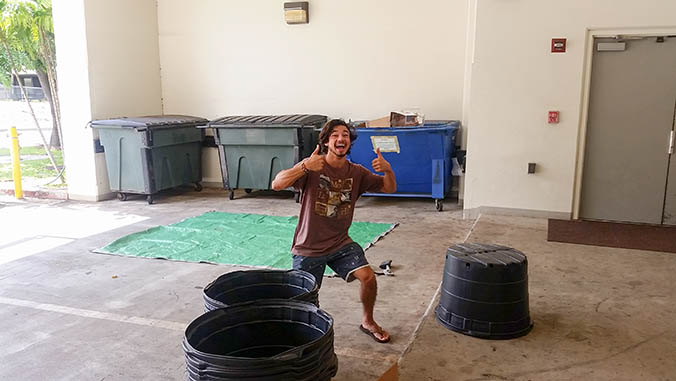

The University of Hawaiʻi at Mānoa will be conducting an audit designed to highlight the reality of the campus waste stream for students, faculty and administrators, while providing valuable data to empower better decision making and holistic procurement and disposal practices. The UH Mānoa community is invited to help sort, categorize and weigh waste during the second campus-wide waste audit in almost 20 years from 8:30 a.m. to 1:30 p.m. on Legacy Path October 19–20.
“This waste audit is an important step in achieving our waste reduction goals at UH Mānoa,” said Navin Tagore-Erwin, a UH Office of Sustainability waste reduction fellow.
For most people, trash is something better left out of sight and out of mind. However, waste habits have fiscal and environmental consequences. Based on procurement records, UH Mānoa uses 21 tons of paper towels annually. This cost was more than $98,000 in 2016, and paper towels alone created enough waste to cover 2,121 miles (nearly the distance from Hawaiʻi to California). There are economic and environmental impacts (deforestation, depletion of freshwater resources and transportation emissions) associated with the production and distribution of paper towels.
“In order to manage our waste we need to first understand what we are throwing away so that we can responsibly direct our purchasing and minimize our disposal,” said Roxanne Adams, UH Mānoa director of building and grounds management.
This audit is an update and expansion of a 2008 audit led by a group of students, with the support of building and grounds management. This initial audit provided a valuable baseline of UH Mānoa waste generation and created a value proposition for adopting zero-waste policies.
According to the Zero Waste International Alliance, “zero waste” is “a goal that is ethical, economical, efficient and visionary, to guide people in changing their lifestyles and practices to imitate sustainable natural cycles, where all discarded materials are designed to become resources for others to use.”
The 2017 audit will target specific types of waste (i.e. plastic utensils, disposable beverage containers) to enable a more targeted response from the UH community. This audit protocol will be shared as a template for other UH campuses to consider in order to assist the systemwide waste footprint per the direction of a UH Executive Policy on Sustainability. This policy commits UH to cultivate system sustainability through both waste reduction and sustainable procurement (see UH Executive Policy, EP 4.202).
Anyone is welcome to stop by and volunteer to help with the audit. Gloves and water will be provided.


